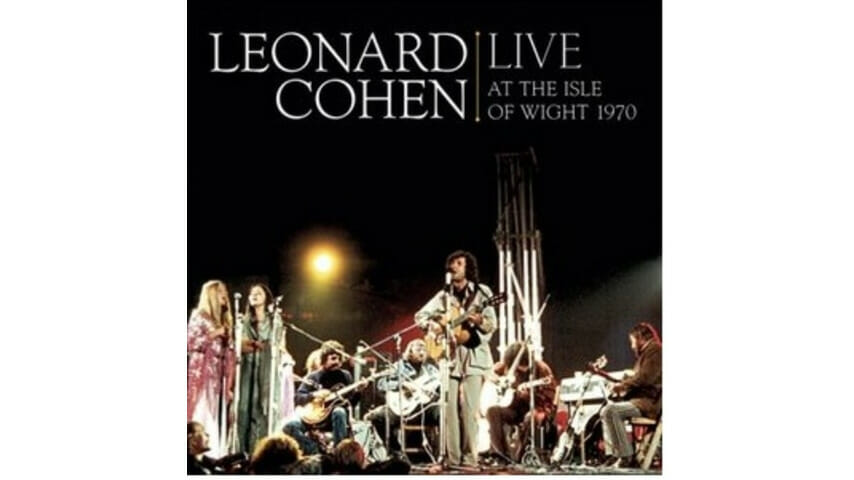
Full of wit, subtle humor, sorrow and insight, bootleg showcases songwriter/poet at peak of his stripped-down powers
When you consider the whole package (words, melody, chord structure), Bob Dylan may very well be our greatest songwriter, but, lyrically, no one—not even Dylan—can touch Leonard Cohen’s painstakingly crafted poetry. Dylan channeled, pulling one winedrunk watercolor phrase after another from the ether, bottling electricity. Cohen, though, wasn’t so much a lighting rod; his timeless songs unfolded with the weight and deliberation of a glacier. They didn’t feel plucked from the great beyond, but rather conceived within—incubated and nurtured before being born into our world, each a balling, stark-naked, wide-eyed infant. This CD/DVD combo of Cohen’s masterful 1970 Isle of Wight performance captures all of this. The full band and backup singers Cohen performs with keep the arrangements fittingly sparse, and he slips tiny but moving spoken-word vignettes into the cracks between tunes.
Live at the Isle of Wight was originally to be called My Sad and Famous Songs but, at the last minute, the title was scrapped. This is fortunate—while it’s true that Cohen writes some of the heaviest songs you’ll hear, and that his dour delivery gives him his (often deserved) reputation as an artist who’s inspired quite a bit of wrist-slashing, the proposed title would have reinforced an overly simplistic perspective that fails to consider Cohen’s disarming onstage charm and potent if subtle sense of humor. Mid-set on Isle of Wight, Cohen begins delivering what, at first, seems like a ponderous activist poem so common to the era: “As for the political situation, “ he says, “they locked up a man who wanted to rule the world. The fools, they locked up the wrong man.” The crowd cheers, and Cohen continues, “ A man who eats meat wants to get his teeth into something. A man who does not eat meat wants to get his teeth into something else.” There’s a long pause, and then Cohen adds, “If these thoughts interest you for even a moment, you are lost.”
It’s refreshing to see this artist from the love-and-peace era so hilariously undercut himself and the whole self-serious Woodstock generation, to which it seemed, he never quite belonged. No, Cohen’s body of work and the performances on this disc feel like they exist outside of the time and place they were created—outside of any time and place for that matter. Which makes them all the more powerful.